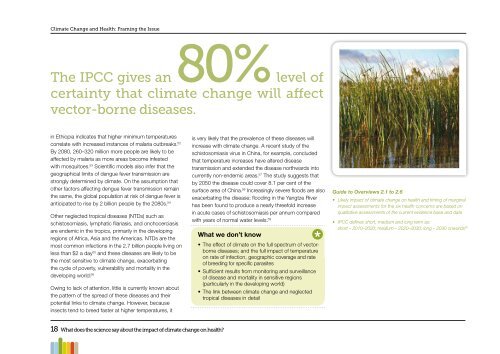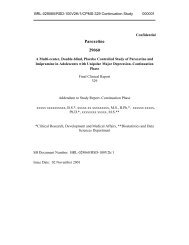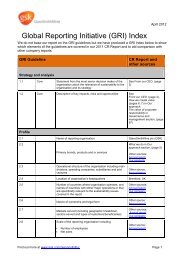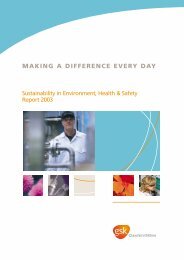Climate Change and Health: Framing the issue
Climate Change and Health: Framing the issue
Climate Change and Health: Framing the issue
You also want an ePaper? Increase the reach of your titles
YUMPU automatically turns print PDFs into web optimized ePapers that Google loves.
<strong>Climate</strong> <strong>Change</strong> <strong>and</strong> <strong>Health</strong> <strong>Health</strong>: <strong>Framing</strong> Paper <strong>the</strong> Issue<br />
The IPCC gives an 80% level of<br />
certainty that climate change will affect<br />
vector-borne diseases.<br />
in Ethiopia indicates that higher minimum temperatures<br />
correlate with increased instances of malaria outbreaks. 52<br />
By 2080, 260–320 million more people are likely to be<br />
affected by malaria as more areas become infested<br />
with mosquitoes. 53 Scientific models also infer that <strong>the</strong><br />
geographical limits of dengue fever transmission are<br />
strongly determined by climate. On <strong>the</strong> assumption that<br />
o<strong>the</strong>r factors affecting dengue fever transmission remain<br />
<strong>the</strong> same, <strong>the</strong> global population at risk of dengue fever is<br />
anticipated to rise by 2 billion people by <strong>the</strong> 2080s. 54<br />
O<strong>the</strong>r neglected tropical diseases (NTDs) such as<br />
schistosomiasis, lymphatic filariasis, <strong>and</strong> onchocerciasis<br />
are endemic in <strong>the</strong> tropics, primarily in <strong>the</strong> developing<br />
regions of Africa, Asia <strong>and</strong> <strong>the</strong> Americas. NTDs are <strong>the</strong><br />
most common infections in <strong>the</strong> 2.7 billion people living on<br />
less than $2 a day 55 <strong>and</strong> <strong>the</strong>se diseases are likely to be<br />
<strong>the</strong> most sensitive to climate change, exacerbating<br />
<strong>the</strong> cycle of poverty, vulnerability <strong>and</strong> mortality in <strong>the</strong><br />
developing world. 56<br />
Owing to lack of attention, little is currently known about<br />
<strong>the</strong> pattern of <strong>the</strong> spread of <strong>the</strong>se diseases <strong>and</strong> <strong>the</strong>ir<br />
potential links to climate change. However, because<br />
insects tend to breed faster at higher temperatures, it<br />
018Introduction<br />
18 What does <strong>the</strong> science say about <strong>the</strong> impact of climate change on health?<br />
is very likely that <strong>the</strong> prevalence of <strong>the</strong>se diseases will<br />
increase with climate change. A recent study of <strong>the</strong><br />
schistosomiasis virus in China, for example, concluded<br />
that temperature increases have altered disease<br />
transmission <strong>and</strong> extended <strong>the</strong> disease northwards into<br />
currently non-endemic areas. 57 The study suggests that<br />
by 2050 <strong>the</strong> disease could cover 8.1 per cent of <strong>the</strong><br />
surface area of China. 58 Increasingly severe floods are also<br />
exacerbating <strong>the</strong> disease; flooding in <strong>the</strong> Yangtze River<br />
has been found to produce a nearly threefold increase<br />
in acute cases of schistosomiasis per annum compared<br />
with years of normal water levels. 59<br />
What we don’t know<br />
*<br />
• The effect of climate on <strong>the</strong> full spectrum of vectorborne<br />
diseases; <strong>and</strong> <strong>the</strong> full impact of temperature<br />
on rate of infection, geographic coverage <strong>and</strong> rate<br />
of breeding for specific parasites<br />
• Sufficient results from monitoring <strong>and</strong> surveillance<br />
of disease <strong>and</strong> mortality in sensitive regions<br />
(particularly in <strong>the</strong> developing world)<br />
• The link between climate change <strong>and</strong> neglected<br />
tropical diseases in detail<br />
Guide to Overviews 2.1 to 2.6<br />
• Likely impact of climate change on health <strong>and</strong> timing of marginal<br />
impact assessments for <strong>the</strong> six health concerns are based on<br />
qualitative assessments of <strong>the</strong> current evidence base <strong>and</strong> data<br />
• IPCC defines short, medium <strong>and</strong> long term as:<br />
short – 2010–2020; medium – 2020–2030; long – 2030 onwards 60
















